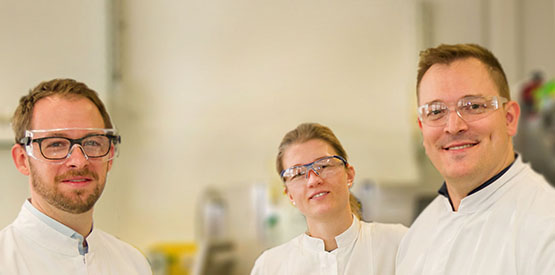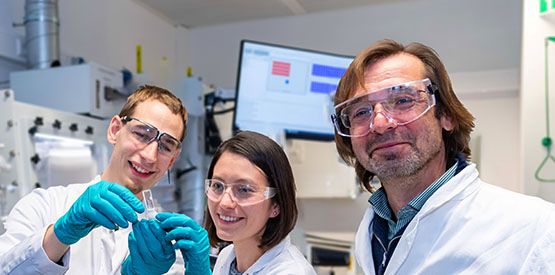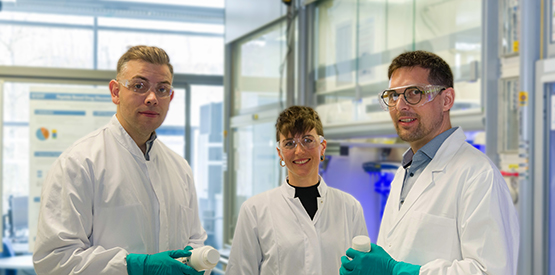Stabilizing biologics for room temperature storage
How would you propose to increase the stability of antibody-derived biopharmaceuticals to enable long-term storage and distribution at room temperature without the need for a cold chain?

Szabolcs Soeroes
Principal Scientist
Boehringer Ingelheim

Anja Engela
Expert Submission
Boehringer Ingelheim
Call for proposals: All incoming answers will be evaluated by a scientific jury, and, upon selection, chosen proposals are pursued through a joint collaboration with the successful applicants.
Initial research funding of up to USD 80,000 will be available for proposals that will deliver tangible results within a 12-months’ time period and that will receive support by our review team.
Background information
What is the context of the problem that we would like to solve?
Antibody-derived biological drugs are inherently unstable and over time they undergo physical changes e.g., unfolding, aggregation, and chemical modifications such as oxidation, deamidation, fragmentation. The kinetics of the different degradation pathways are dependent on temperature and molecule mobility. Therefore, antibody-derived biological drugs are typically refrigerated at 2 – 8°C to maintain their quality and safety during storage and distribution. In addition, some molecules require further stabilization by drying, typically by lyophilization. Of all biological drugs that have been approved by the FDA in the past approximately 50 years only about 7% are stored at room temperature, all those as lyophilized formulations1.
Cold chain and lyophilization are energy consuming processes, produce significant amounts of green-house gases (GHG), and thus are important contributors to the environmental footprint of biopharmaceuticals2-4. Avoiding a cold chain for antibody-derived biological drugs would not only have a positive environmental impact; it would also have beneficial societal and economic implications by improving global access to medicines, making logistics more robust and cost-efficient, and reducing medicine wastage due to unwanted temperature excursions or inadequate storage. In addition, if there was no need to refrigerate the drug, patient convenience and compliance would likely increase, potentially leading to improved patients’ response to treatment5,6.
To address the issues described above, we are looking for molecule non-specific approaches to stabilize antibody-derived biological drugs for long-term storage at room temperature. At the same time, these approaches should reduce the energy and carbon footprint of the manufacturing process compared to conventional lyophilization. Any proposed solution should be readily developable for parenteral administration and commercial scale GMP manufacturing.
What potential solutions could be in scope?
- Approaches to stabilize antibody-derived biological drugs for long-term storage at room-temperature
- Innovative formulations including but not limited to solid formulations
- Solutions enabling manufacturing with reduced energy requirements and environmental footprint compared to conventional lyophilization
- Suitable for various antibody-derived molecule formats; molecule non-specific approach
- Developable for human use and parenteral administration
- Readily developable for commercial scale GMP manufacturing in the next 1-2 years
What potential solutions would be out of scope?
- Proposals that do not focus on approaches to stabilize antibody-derived biological drugs for long-term storage at room temperature
- Proposals not considering how their approach would impact the energy and carbon footprint of the manufacturing process
- Proposals with approaches not directly applicable to antibody-derived biological molecules, e.g., solely focusing on small molecules, etc.
- Proposals based on molecule engineering or antibody drug conjugate (ADCs)
- Technologies that are not readily developable for human use and for commercial manufacturing in the next 1-2 years
What benefits do we offer to you in exchange for having submitted a solution?
If your project is selected, you will have the opportunity to directly collaborate with the Pharmaceutical Development Biologicals Team of Boehringer Ingelheim.
You can expect appropriate funding for the intended 12-month collaboration period. Your exact funding request should be outlined in your proposal. As a framework, we suggest that your initial funding request is structured by milestones and does not exceed USD 80,000.
The opportunity for a funded stay at Boehringer Ingelheim for technology exchange / training is potentially available.
Our collaboration agreement will provide full transparency about each partner’s rights & obligations (including intellectual property rights). A final comprehensive report is due one month after the end of the grant period. As part of the agreement, you will be encouraged to publish your results in a peer-reviewed technical journal within 6 months after conclusion of the work. Each publication prepared in connection with Boehringer Ingelheim´s Innovation Unit (IU) More Green Grant shall make acknowledgement in the following manner: “This manuscript was developed with the support of Boehringer Ingelheim’s IU More Green Grant program, whose intent is to minimize the environmental footprint of future medicines through sustainable science, technology and innovation. Boehringer Ingelheim is a leading research-driven biopharmaceutical company that creates value through innovation in areas of high unmet medical need, and is working on breakthrough therapies that transform lives, today and for generations to come. Founded in 1885 and family-owned ever since, Boehringer Ingelheim takes a long-term perspective. Its commitment to contribute towards a healthier and more sustainable future is firmly anchored in our corporate philosophy since its founding and translated through the Sustainable Development for Generations (SD4G) framework. More than 52,000 employees serve over 130 markets in the three business areas, Human Pharma, Animal Health, and Biopharmaceutical Contract Manufacturing.“
To maintain the highest degree of an open innovation environment, we plan to announce the winner(s) publicly and feature them on opnMe.com and our social media channels.
What are the key success criteria on which we base our selection for the best answer?
We are seeking research collaboration proposals that contain:
- A well-structured proposal outlining a new and compelling scientific approach.
- Outlining of the technical feasibility, and existing proof-of-concept data or previous publications that support feasibility / experience with outlined technology. The provided information should include stability data at ≥25°C with a monoclonal antibody model protein, based on existing techniques and established assays.
- Outline of how the proposed approach would reduce the energy and carbon footprint of the manufacturing process compared to conventional lyophilization.
- Your exact funding request should be outlined in your proposal based on a well-thought-through project. The project should be structured in milestones and planned with key decision points (clear Go/No-Go criteria). The funding request should not exceed USD 80,000.
- We will only consider project proposals which can be completed within 12 months or less. Within this period, you should be able to generate confirmation about your hypothesis based on predefined experimental milestones, as well as publishable results.
- Proven track record in the required field of expertise.
- Ability to implement the outlined solution as part of a scientific collaboration project with Boehringer Ingelheim including access to a laboratory.
What information should be included in your answer submission?
Please use our answer submission template to provide a 2–3-page non-confidential proposal (available for download here).
If confidential data exists that would strengthen the proposal, please indicate that information is available to share under a Confidential Disclosure Agreement (CDA). If we find the non-confidential concept proposal sufficiently interesting, we will execute a CDA for confidential discussions.
Summary
We are currently seeking answers for the following scientific challenge: How would you propose to increase the stability of antibody-derived biopharmaceuticals to enable long-term storage and distribution at room temperature without the need for a cold chain?
All incoming answers accompanied by a collaboration proposal will be evaluated by a scientific jury, and, upon selection, chosen proposals are pursued through a joint collaboration with the successful applicants. Initial funding of up to USD 80,000 will be available for each selected proposal.
We can only accept research proposals if they arrive by the submission deadline on October 15, 2023, 11.59 pm PST.
References
https://www.cdek.liu.edu/ [latest access on 19 July 2023]
https://www.cdek.liu.edu/ [latest access on 19 July 2023]
Net-zero emission solutions for transport refrigeration in a sustainable cold chain
Gloël J., Papst I., Pal N., Oppelt D.
Deutsche Gesellschaft für Internationale Zusammenarbeit (GIZ) GmbH 2022.
https://www.cenex.co.uk/news/greening-refrigerated-transport/ [latest access on 19 July 2023]
https://www.cenex.co.uk/news/greening-refrigerated-transport/ [latest access on 19 July 2023]
Freeze drying in the biopharmaceutical industry: An environmental sustainability assessment
Renteria Gamiz A. G., Dewulf J., De Soete W., Heirman B., Dahlin P., Jurisch C., Krebser U., De Meester S.
Food and Bioproducts Processing 2019, 117, 213-223.





